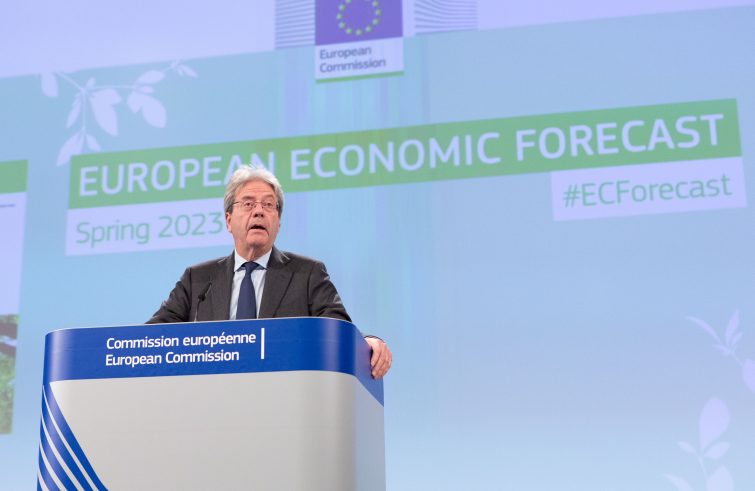
“We avoided a recession”, while “European economy continues to show resilience in a challenging global context.” In the presentation of the ‘Spring Economic Forecast’ in Brussels on May 15, EU Commissioner for the Economy Paolo Gentiloni outlined the lights and shadows of the EU27 economy. The Commissioner noted, with figures and charts, that the declining energy costs bring some vitality to manufacturing and consumer spending, that inflation is declining, although “core inflation remains persistently high”, and that there remain country differences (indeed divergences) concerning public finance. On a positive note, the labour market is showing signs of improvement, while global turbulence remains a source of risks that should not be underestimated.
“Remain united”. This “better-than-expected start to the year lifts the growth outlook for the EU economy to 1.0% in 2023 (0.8% in the Winter interim Forecast) and 1.7% in 2024 (1.6% in the winter).” Upward revisions for the euro area are of a similar magnitude, with GDP growth now expected at 1.1% and 1.6% in 2023 and 2024 respectively. Inflation stands at 5.8% in 2023 and 2.8% in 2024 in the euro area, reads the Economic Forecast presented by Paolo Gentiloni.
“The European economy is in better shape than we projected last autumn”, said Commissioner Gentiloni.
“Thanks to determined efforts to strengthen our energy security, a remarkably resilient labour market and easing supply constraints, we avoided a winter recession and are set for moderate growth this year and next.” Moreover, “inflation has proved stickier than expected but it is forecast to decline gradually over the remainder of 2023 and in 2024. And the improvement in public finances is set to continue as energy support measures are progressively withdrawn.” However, the Commissioner pointed out, “risks remain too plentiful for comfort and Russia’s brutal invasion of Ukraine continues to cast a shadow of uncertainty over the outlook. We must remain vigilant – and stand ready to respond to any future shocks with the same unity and determination that saw us through these past three stormy years.” “I think we should be proud that the European economy is showing such remarkable resilience. This is no small achievement”, said the Commissioner. But “this is no reason for complacency”, since “inflation remains high, and this means we must ensure that fiscal policy is consistent with our policy priorities.” In the same vein, it is important to “maintain the momentum in the implementation of the Recovery and Resilience Plans.”
Stagnant wages. “The European economy has managed to contain the adverse impact of Russia’s war of aggression against Ukraine, weathering the energy crisis thanks to a rapid diversification of supply and a sizeable fall in gas consumption”, states the Forecast document. “Markedly lower energy prices are working their way through the economy, reducing firms’ production costs. Consumers are also seeing their energy bills fall, although private consumption is set to remain subdued as wage growth lags inflation.”
The labour market remains “resilient”, reads the document: the EU unemployment rate “hit a new record low of 6.0% in March 2023.”
Employment growth is forecast at 0.5% this year, before edging down to 0.4% in 2024. The unemployment rate is projected to remain just above 6%.
Several risk factors. “The EU economy is holding up remarkably well in the face of Russia’s aggression against Ukraine, leading to an upgrade in today’s growth forecast for 2023. We are also seeing a strong labour market and record-low unemployment”, declared Valdis Dombrovskis, Executive Vice-President of the EU Commission, commenting on the Spring Economic Forecast. “With energy prices clearly down, governments should be able to phase out support measures and reduce their debt burdens. However, there are many risk factors we need to watch. Core inflation remains persistently high, which could erode people’s purchasing power, slow investment growth and impede access to credit.” The forecast document shows that
“new challenges may arise for the global economy following the banking sector turmoil or related to wider geopolitical tensions.”
On the positive side, “more benign developments in energy prices would lead to a faster decline in headline inflation, with positive spillovers on domestic demand. Finally, there is persistent uncertainty stemming from Russia’s ongoing invasion of Ukraine.” The forecast publication includes for the first time an overview of the economic structural features, recent performance and outlook for Ukraine, Moldova and Bosnia and Herzegovina, which were granted candidate status for EU membership by the Council in June and December 2022.
Italy, GDP slowdown. The Spring Economic Forecast presented by the European Commission sees “real GDP growth forecast to slow down to 1.2% in 2023 and 1.1% in 2024, as higher prices dampen private consumption while investment, supported by government measures, continues to expand vigorously.” The inflation rate is set to moderate to 6.1% this year, thanks to falling energy prices, and decrease further to 2.9% in 2024. “In 2021-22, households saved less, but kept consuming and investing at a robust pace, thanks to the savings accumulated in previous years, to housing energy efficiency tax credits and to other government support measures introduced to mitigate the impact of high energy prices.” Italian companies are expected “to use profits to fund new investments, thus countering the negative effects of higher interest rates and tighter lending conditions.”
The Commission expects Italy’s employment rate to grow.
Moreover, it notes that “the government deficit is projected to continue declining, while the pace of public debt reduction is set to slow down.” Italy’s debt-to-GDP ratio is set to decrease to 140.3% by 2024. During the press conference Gentiloni expressed his willingness to discuss modifications to the national NRRP with the Italian government. He further observed that for this year “we expect the highest growth for Italy among the major European economies. I believe this is something that did not happen for a long time.”











